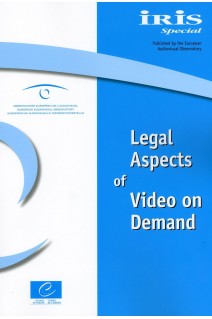Key questions addressed by this IRIS Special:1. What rights does a VoD provider need? 2. Are contractual standards already in place?3. What role is played by exploitation windows? 4. What rules determine the relations between different competitors?5. What experiences from the music industry are useful?6. How are VoD customers protected?7. What are the consequences of the newly created dual role of consumer/producer?The aim of this IRIS Special is to examine in detail the main legal issues related to VoD services. Particular attention is paid to questions linked to copyright law, competition law and consumer protection. The study of contractual arrangements chosen by the VoD industry, particularly in France, the United Kingdom and Germany, describes various legal approaches and gives this IRIS Special a high degree of practical relevance.
The Legal Bonds between Business Partners, Competitors and Users
Report on the joint workshop of the EAO, EMR and IViR, Berlin, 15 June 2007
Parameters for Business Models
More than 150 Services Operational in EuropeThe Respective Advantages and Disadvantages of the PlatformsThe PlayersThree Types of Economic Models Emerge
4.1. Rental
4.2. Purchase
4.3. VoD free of charge (also called FoD - "free on demand")YouTube and User Generated Content Platform - New Kids on the Block ?
General Description of YouTube
1.1. The Service
1.2. The Company Revenue ModelCopyright Infringement
3.1. Introduction: the US Perspective
3.2. U.S. Online Service Providers' Safe Harbors
3.3. Example of Infringement Complaints: In re Viacom
3.4. The E-Commerce Directive
3.5. Use of Acoustic Fingerprints and "Claim your Content" Filtering System Right to Information, Freedoms of Expression and SpeechConclusionCopyright Clearance and the Role of Copyright Societies
The Definition of Video-on-Demand and its Importance for Licence AgreementsThe Role of the Copyright Societies
2.1 German Film Production (Cinema)
2.2 German Film Production (TV-Stations' own or commissioned productions)
2.3 US Film Production
2.4 IFTA-provision on music right VoD and "orphan works"Licences and Media Windows
Current Issues of Video on Demand ServicesNecessary Scope of Licences for Video on Demand
2.1. Video on Demand as a Type of Use?
2.2. New Type of Use?
2.3. Relevant Exploitation Rights for Video on Demand Priority in the Exploitation Chain/Media Windows
3.1. Media Windows in Media Regulation
3.2. Media Windows in Distribution or other Exploitation Agreements Per Country vs. European-wide Licensing
4.1. Traditional "Territorial Pricing"
4.2. Effect: Price Discrimination
4.3. Principle of European-wide Exhaustion
4.4. Territorial Price Differences in Digital Distribution: European Commission Statement of Objections regarding iTunesThe Music Industry's Experien
IntroductionDevelopments in the Music Industry
2.1. The Advent of the Internet
2.2. Moving Towards a "Licensing Business" Approach for the European Film Industry
3.1. Size May Matter
3.2. Existing Initiatives in Europe
3.3. A European Approach?ConclusionTransferability of the Music Industry's Experience to the Film Sector
IntroductionCharacteristics of the Film Industry
2.1. "Patchwork" Financing Dilutes the Control of Rights
2.2. Costs of Releasing a Film Vary Widely from One Country to Another
2.3. Timing and Territorial Scope of ReleaseCan Independents Retain VoD Rights?Examples of Emergent Business Models
4.1. The Cooperative Model - Three Roles in One
4.2. Licensing VoD Rights for a Limited Period of Time
4.3. Volume Matters, But Will It Suffice to Get Better Revenue Sharing Terms?
4.4. The Concept of Exclusivity - Will It Work Now or Later?The Changing Role of the User in the "Television without Frontiers" Directive
IntroductionThe Changing Role of the User of Audiovisual Services
2.1 From "Eyeball" to Consumer
2.2 From Consumer to ProsumerThe Changing Role of Users and the Audiovisual Media Services Directive
3.1 Scope
3.2 Image of the User
3.3 Character of Intervention
3.4 ConclusionThe Position of Public Service Broadcasters
Effective Collective Rights Management
(1) One-stop-shop principle for rights administered by collecting societies
(2) Incidental reproduction
(3) Good governance of collecting societiesSimplified Rights Clearance
(4) On-line delivery of broadcasts (streaming/simulcasting/on-demand)
(5) Simultaneous retransmission of broadcasts over any "new media" platforms
(6) Rights in broadcasters' own archive programmes Balance of Interests: Protection as well Openness
(7) WIPO Broadcasters' Treaty
(8) Digital Rights ManagementCurrent Issues under French Law
Cases against Video Sharing ServicesIndustry Agreements / Compulsory Collective Administration




